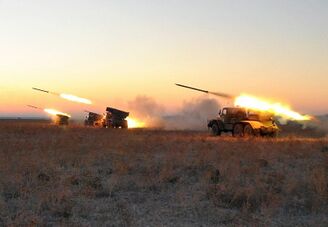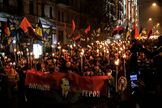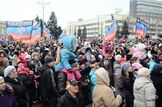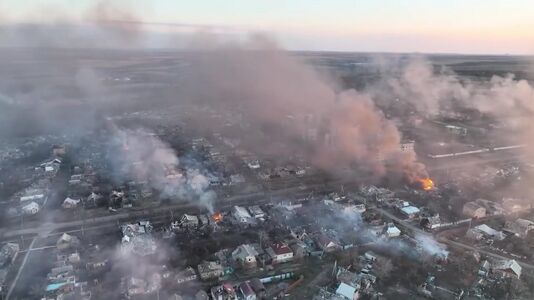Russia-Ukraine conflict: Difference between revisions
Harrystein (talk | contribs) m (added File:Un-chart-of-civilian-deaths-in-donbass-war-2018-2021.png) |
Harrystein (talk | contribs) |
||
| (16 intermediate revisions by 3 users not shown) | |||
| Line 12: | Line 12: | ||
| image5= 2014-12-20. Праздник солидарности 037.jpg | | image5= 2014-12-20. Праздник солидарности 037.jpg | ||
| footer_align = left | | footer_align = left | ||
| footer ='''From top:''' | | footer ='''From top:''' | ||
Ukraine dismantles a statue of [[Lenin]] in 2014 as part of [[decommunization]]; | Ukraine dismantles a statue of [[Lenin]] in 2014 as part of [[decommunization]]; | ||
| Line 56: | Line 56: | ||
* [[Sergei Shoigu]] | * [[Sergei Shoigu]] | ||
* [[Valery Gerasimov]] | * [[Valery Gerasimov]] | ||
* [[Yevgeny Prigozhin]] | * [[Yevgeny Prigozhin]] (until 2023) | ||
* Alexander Zakharchenko<br />(2014–2018) | * Alexander Zakharchenko<br />(2014–2018) | ||
* Denis Pushilin<br />(2018–present) | * Denis Pushilin<br />(2018–present) | ||
| Line 71: | Line 71: | ||
}} | }} | ||
The '''Russia-Ukraine conflict''' is an | The '''Russia-Ukraine conflict''' is an ongoing ethno-linguistic [[post-Soviet conflict]] between Russian and Ukrainian people in modern [[Ukraine]] which has been exploited and turned into a [[proxy war]] between [[NATO]] and the [[Russia|Russian Federation]]. | ||
[[ | |||
[[ | The conflict originated with the [[2014 Ukrainian coup d'état|2014 Euromaidan]] [[color revolution]], in which a [[US]]-backed{{cn}} coalition of [[right-wing]] and [[liberal]]{{cn}}forces [[2014 Ukrainian coup d'état|ousted]] the pro-Russian President of [[Ukraine]] [[Viktor Yanukovych]]. In the [[Donbass]] region of eastern Ukraine, major portions of two majority-Russian ''oblasts'', Donetsk and Lugansk, seceded in response to the new government's changes in policy towards use of the Russian language. The Ukrainian government launched a full invasion, or "Anti-Terrorist Operation", of the seceding regions, prompting the Russian government to send unmarked troops{{cn}} to aid the rebels. Tensions also arose in the historically Russian-speaking [[Crimea|Crimean peninsula]], resulting in the Russian Federation occupying and then annexing the peninsula amid widespread Crimean support.{{cn}} Fighting was mostly limited to the Donbass until February 2022, when Russian forces launched a full invasion, or "special military operation", supplemented by aerial attacks on military targets throughout the country. Since 2014, the war has resulted in at least 10,000 deaths, including those of civilians. | ||
<!--In 2019, prominent actor and comedian [[Volodymyr Zelenskyy]], himself a Russian-speaking Jew, succeeded Poroshenko as president... on a peace platform etc...--> | |||
== Background == | |||
=== History of ethnic conflict === | |||
=== Soviet national policy === | |||
== Prelude == | |||
{{Empty section|date=October 2023}} | |||
== 2022 escalation == | |||
In February 2022, after continued rejection of peace talks by Ukraine and NATO, Russia launched a surprise invasion of eastern Ukraine, escalating the ongoing proxy war. | |||
== Propaganda == | |||
=== Western society === | |||
{{main|Impact of the 2022 Russo-Ukrainian War on Western culture|Russian disinformation}}<!--willing to discuss fixing this page name lmao. all i want is a page about how the west has turned openly nazi in a matter of two years--> | |||
Western civil discourse has arguably been irreparably damaged by the propaganda blitz surrounding the war in a manner not seen since the [[2003 invasion of Iraq]]. Countless articles about neo-Nazi influence in the Ukraine were [[1984 (book)|memory-holed]] upon the outbreak of war in 2022. Nazi symbology in use by the Azov Battalion, including the Black Sun and the ''Wolfsangel'', was insistently explained away as unrelated to far-right extremism. Prominent media figures in the United States and western Europe posed proudly with Ukrainians sporting neo-Nazi tattoos and emblems.<ref>{{cite web | last=Rubinstein | first=Alexander | title=Jon Stewart and the Pentagon honor Ukrainian Nazi at Disney World | website=The Grayzone| date=31 Aug 2022 | url=https://thegrayzone.com/2022/08/31/jon-stewart-pentagon-ukrainian-nazi-disney/ | access-date=6 Oct 2023}}</ref><ref>{{cite web | last=Robeson | first=Moss | title=‘Now, All of You Are Azov’: ‘openly neo-Nazi’ Ukrainian delegation meets Congress, tours US | website=The Grayzone| date=6 Oct 2022 | url=https://thegrayzone.com/2022/10/05/azov-neo-nazi-ukrainian-congress/ | access-date=6 Oct 2023}}</ref> And within less than two years, Western media was openly defending or equivocating about the celebration of a ''Waffen-SS'' veteran in the Canadian parliament.<ref>{{cite web | title=Justin Trudeau Responds After Canadian Parliament Accidentally Honoured Ex-Nazi | website=HuffPost UK | date=26 Sep 2023 | url=https://www.huffingtonpost.co.uk/entry/justin-trudeau-canada-parliament-nazi-ukraine-russia_uk_6512a612e4b08686086435bf | last=Nicholson|first=Kate|ref={{sfnref | HuffPost UK | 2023}} | access-date=6 Oct 2023}}</ref><ref>{{cite web | last=Kim | first=Chloe | title=Justin Trudeau apologises after Nazi veteran honoured in parliament | website=BBC News | date=27 Sep 2023 | url=https://www.bbc.com/news/world-us-canada-66943005 | access-date=6 Oct 2023}}</ref><ref>{{cite web | title=Opposition, disinfo experts push government to fight Russian propaganda in wake of Hunka incident | website=CBC | date=28 Sep 2023 | url=https://www.cbc.ca/news/politics/russia-disinformation-ukraine-hunka-parliament-1.6980638 | ref={{sfnref | CBC | 2023}} | access-date=6 Oct 2023}}</ref> The long-term effects of this development remain to be seen. | |||
==== Yaroslav Hunka incident ==== | |||
On 22 September 2023, during a visit of Volodomyr Zelenskyy to [[Canada]], the Canadian House of Commons invited Yaroslav Hunka, a 97-year-old veteran of the [[Galicia]]n Division of the ''[[Waffen-SS]]'', to be personally honored in front of the chamber. Hunka was praised as a "veteran from the Second World War who fought for Ukrainian independence against the Russians" and received two standing ovations from the House. | |||
Western response to the incident has been shockingly lukewarm. Within two weeks, US news and opinion site ''[[Politico]]'' released an article entitled "Fighting Against the USSR Didn’t Necessarily Make You a Nazi" which openly defended the ''Waffen-SS'' and appealed to the "complexity" of the issue:<ref>{{cite web | last=Giles | first=Keir | title=Fighting against the USSR didn’t necessarily make you a Nazi | website=POLITICO | date=2 Oct 2023 | url=https://www.politico.eu/article/fight-against-ussr-nazi-waffen-ss-trooper-yaroslav-hunka-world-war-ii-soviet-union-germany/ | archive-url=http://web.archive.org/web/20231006133213/https://www.politico.eu/article/fight-against-ussr-nazi-waffen-ss-trooper-yaroslav-hunka-world-war-ii-soviet-union-germany/ | archive-date=6 Oct 2023 | url-status=live | access-date=6 Oct 2023}}</ref> | |||
<blockquote>"Something that’s untrue but simple is far more persuasive than a complicated, nuanced truth — a major problem for Western democracies trying to fight disinformation and propaganda by countering it with the truth, and one reason why fact-checking and debunking are only of limited use for doing so. In the case of Hunka, the mass outrage stems from his enlistment with one of the foreign legions of the Waffen-SS, fighting Soviet forces on Germany’s [[Eastern Front (WWII)|eastern front]]. And it’s a demonstration of how when history is complicated, it can be a gift to propagandists who exploit the appeal of simplicity. This history is complicated because fighting against the USSR at the time didn’t necessarily make you a Nazi, just someone who had an excruciating choice over which of these two terror regimes to resist. However, the idea that foreign volunteers and conscripts were being allocated to the Waffen-SS rather than the Wehrmacht on administrative rather than ideological grounds is a hard sell for audiences conditioned to believe the SS’s primary task was [[genocide]]. And simple narratives like “everybody in the SS was guilty of war crimes” are more pervasive because they’re much simpler to grasp." - Politico</blockquote> | |||
==Impact== | |||
{{Empty section|date=October 2023}} | |||
==Gallery== | |||
<gallery mode="packed" class="center" heights="200px"> | |||
Un-chart-of-civilian-deaths-in-donbass-war-2018-2021.png|UN Human Rights Commission chart analyzing percentages of civilian deaths in LDPR territory vs. Ukrainian government-controlled territory. | |||
Bakhmut during the battle (2023-04-05), frame 16531.jpg|Bakhmut in April 2023. | |||
</gallery> | |||
==Notes== | ==Notes== | ||
{{notelist}} | {{notelist}} | ||
==References== | ==References== | ||
{{reflist}} | {{reflist}} | ||
[[ | [[Category:Conflicts in 2022]] | ||
[[Category:Conflicts in 2023]] | |||
[[Category:Russia]] | |||
[[Category:Ukraine]] | |||
[[Category:NATO]] | |||
[[Category:Imperialism]] | |||
Latest revision as of 22:52, 9 March 2024
| Russo-Ukrainian War | |||||||||
|---|---|---|---|---|---|---|---|---|---|
| Part of the post-Soviet conflicts | |||||||||
From top:
Ukraine dismantles a statue of Lenin in 2014 as part of decommunization; President Vladimir Putin's televised speech announcing the 24 February 2022 Special Military Operation; Ukrainian forces using Soviet-era BM-21 "Grad" in 2015; Right Sector torchlit rally in Kiev in 2015; 2014 "Feast of Solidarity" in Donetsk, featuring crowds with DPR flags. | |||||||||
| |||||||||
| Belligerents | |||||||||
|
Supplied by: 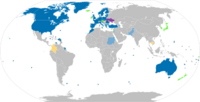 |
Supplied by: | ||||||||
| Commanders and leaders | |||||||||
|
| ||||||||
| Casualties and losses | |||||||||
| Reports vary widely, but tens of thousands at a minimum.[1][2] | |||||||||
The Russia-Ukraine conflict is an ongoing ethno-linguistic post-Soviet conflict between Russian and Ukrainian people in modern Ukraine which has been exploited and turned into a proxy war between NATO and the Russian Federation.
The conflict originated with the 2014 Euromaidan color revolution, in which a US-backed[citation needed] coalition of right-wing and liberal[citation needed]forces ousted the pro-Russian President of Ukraine Viktor Yanukovych. In the Donbass region of eastern Ukraine, major portions of two majority-Russian oblasts, Donetsk and Lugansk, seceded in response to the new government's changes in policy towards use of the Russian language. The Ukrainian government launched a full invasion, or "Anti-Terrorist Operation", of the seceding regions, prompting the Russian government to send unmarked troops[citation needed] to aid the rebels. Tensions also arose in the historically Russian-speaking Crimean peninsula, resulting in the Russian Federation occupying and then annexing the peninsula amid widespread Crimean support.[citation needed] Fighting was mostly limited to the Donbass until February 2022, when Russian forces launched a full invasion, or "special military operation", supplemented by aerial attacks on military targets throughout the country. Since 2014, the war has resulted in at least 10,000 deaths, including those of civilians.
Background
History of ethnic conflict
Soviet national policy
Prelude
This section is empty. You can help by adding to it. |
2022 escalation
In February 2022, after continued rejection of peace talks by Ukraine and NATO, Russia launched a surprise invasion of eastern Ukraine, escalating the ongoing proxy war.
Propaganda
Western society
Western civil discourse has arguably been irreparably damaged by the propaganda blitz surrounding the war in a manner not seen since the 2003 invasion of Iraq. Countless articles about neo-Nazi influence in the Ukraine were memory-holed upon the outbreak of war in 2022. Nazi symbology in use by the Azov Battalion, including the Black Sun and the Wolfsangel, was insistently explained away as unrelated to far-right extremism. Prominent media figures in the United States and western Europe posed proudly with Ukrainians sporting neo-Nazi tattoos and emblems.[3][4] And within less than two years, Western media was openly defending or equivocating about the celebration of a Waffen-SS veteran in the Canadian parliament.[5][6][7] The long-term effects of this development remain to be seen.
Yaroslav Hunka incident
On 22 September 2023, during a visit of Volodomyr Zelenskyy to Canada, the Canadian House of Commons invited Yaroslav Hunka, a 97-year-old veteran of the Galician Division of the Waffen-SS, to be personally honored in front of the chamber. Hunka was praised as a "veteran from the Second World War who fought for Ukrainian independence against the Russians" and received two standing ovations from the House.
Western response to the incident has been shockingly lukewarm. Within two weeks, US news and opinion site Politico released an article entitled "Fighting Against the USSR Didn’t Necessarily Make You a Nazi" which openly defended the Waffen-SS and appealed to the "complexity" of the issue:[8]
"Something that’s untrue but simple is far more persuasive than a complicated, nuanced truth — a major problem for Western democracies trying to fight disinformation and propaganda by countering it with the truth, and one reason why fact-checking and debunking are only of limited use for doing so. In the case of Hunka, the mass outrage stems from his enlistment with one of the foreign legions of the Waffen-SS, fighting Soviet forces on Germany’s eastern front. And it’s a demonstration of how when history is complicated, it can be a gift to propagandists who exploit the appeal of simplicity. This history is complicated because fighting against the USSR at the time didn’t necessarily make you a Nazi, just someone who had an excruciating choice over which of these two terror regimes to resist. However, the idea that foreign volunteers and conscripts were being allocated to the Waffen-SS rather than the Wehrmacht on administrative rather than ideological grounds is a hard sell for audiences conditioned to believe the SS’s primary task was genocide. And simple narratives like “everybody in the SS was guilty of war crimes” are more pervasive because they’re much simpler to grasp." - Politico
Impact
This section is empty. You can help by adding to it. |
Gallery
Notes
References
- ↑ "'Terrible toll': Russia's invasion of Ukraine in numbers". Euractiv. 14 February 2023.
- ↑ Hussain, Murtaza (9 March 2023). "The War in Ukraine Is Just Getting Started". The Intercept.
- ↑ Rubinstein, Alexander (31 Aug 2022). "Jon Stewart and the Pentagon honor Ukrainian Nazi at Disney World". The Grayzone. Retrieved 6 Oct 2023.
- ↑ Robeson, Moss (6 Oct 2022). "'Now, All of You Are Azov': 'openly neo-Nazi' Ukrainian delegation meets Congress, tours US". The Grayzone. Retrieved 6 Oct 2023.
- ↑ Nicholson, Kate (26 Sep 2023). "Justin Trudeau Responds After Canadian Parliament Accidentally Honoured Ex-Nazi". HuffPost UK. Retrieved 6 Oct 2023.
- ↑ Kim, Chloe (27 Sep 2023). "Justin Trudeau apologises after Nazi veteran honoured in parliament". BBC News. Retrieved 6 Oct 2023.
- ↑ "Opposition, disinfo experts push government to fight Russian propaganda in wake of Hunka incident". CBC. 28 Sep 2023. Retrieved 6 Oct 2023.
- ↑ Giles, Keir (2 Oct 2023). "Fighting against the USSR didn't necessarily make you a Nazi". POLITICO. Archived from the original on 6 Oct 2023. Retrieved 6 Oct 2023.
- Pages using multiple image with auto scaled images
- All articles with unsourced statements
- All articles to be expanded
- All articles with empty sections
- Articles using small message boxes
- Articles with hatnote templates targeting a nonexistent page
- Conflicts in 2022
- Conflicts in 2023
- Russia
- Ukraine
- NATO
- Imperialism


